|
|
|
Sort Order |
|
|
|
Items / Page
|
|
|
|
|
|
|
| Srl | Item |
| 1 |
ID:
087480
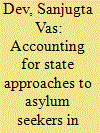

|
|
|
|
|
| Publication |
2009.
|
| Summary/Abstract |
This article uses the case studies of Australia and Malaysia to examine how diverse states in the Asia-Pacific region approach asylum seekers in practice and in discourse. Using a social constructionist approach to identity, the article highlights how governments in each country have grappled with "irregular" migration and the challenges it poses for national identity through processes of "othering" and "exclusion." This comparison shows that the process of excluding asylum seekers on the basis of identity is not a Western phenomenon, but one extending to countries across the region.
|
|
|
|
|
|
|
|
|
|
|
|
|
|
|
|
| 2 |
ID:
188390
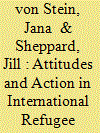

|
|
|
|
|
| Summary/Abstract |
Do citizens care whether their government breaches international law, or are other imperatives more influential? We consider this question in the human rights arena, asking whether and how it matters how abuses are framed. In a novel survey experiment, we ask Australians about their attitudes toward restrictive immigration policy, holding the underlying breaches constant but varying how they are framed. We find that people most strongly oppose policy that violates international law. Emphasizing moral considerations has smaller but still notable impacts on attitudes, whereas reputational frames have the weakest effects. We also find that translating attitudes into political action is challenging: most who learn of current policy's legal, moral, or reputational dimensions and in turn become more critical do not subsequently express greater interest in trying to do something about it. Nonetheless, there are interesting differences across frames. Appealing to international law or moral considerations is more effective at spurring mobilization than emphasizing reputational harm, though via different mechanisms. Framing this debate in international reputational terms consistently has the weakest impacts on interest in political action, and may be worse than saying nothing at all.
|
|
|
|
|
|
|
|
|
|
|
|
|
|
|
|
| 3 |
ID:
147642
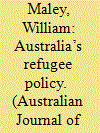

|
|
|
|
|
| Summary/Abstract |
Refugee policy involves a two-level game. For Australia since approximately 1998, the politics of refugees has been toxically affected by domestic politics. This has had potentially negative effects on Australia’s reputation and soft power. This article provides an overview of the issue, explores the ways in which considerations of domestic politics have come increasingly to shape Australia’s policy and concludes with a discussion of the consequences of Australia’s treatment of refugees for its diplomacy and soft power.
|
|
|
|
|
|
|
|
|
|
|
|
|
|
|
|
| 4 |
ID:
190964


|
|
|
|
|
| Summary/Abstract |
In the early 1980s, the People’s Republic of China (PRC) and Japan joined the international refugee regime. This timing similarity is puzzling due to the stark differences between the PRC as a communist and authoritarian state versus Japan as a prime example of capitalist development and democratization. Moreover, although both signed the 1951 Refugee Convention and the 1967 Refugee Protocol without major reservations, neither of them has fully implemented these treaties. Discussions regarding the PRC’s and Japan’s engagement with the international refugee regime tend to start with the beginning of the Indochina refugee crisis in 1975. However, this article shows that the early decades of their interaction with the international refugee regime are of crucial importance for a full understanding of the timing and form of accession to the international refugee regime. Although the Southeast Asian refugee crisis played an important role as a trigger, it was the changing character of the international refugee regime and the transformations of state identity in both countries that set the ground for the signing of the refugee-related conventions.
|
|
|
|
|
|
|
|
|
|
|
|
|
|
|
|
| 5 |
ID:
129096


|
|
|
|
|
| Publication |
2014.
|
| Summary/Abstract |
The categorization of displaced people is grounded in criteria enshrined by international and regional conventions as well as receiving states' asylum and immigration policies. However, drawing distinctions between displaced people remains a controversial issue because the causes of displacement are more diverse than the categories assigned. Whilst various categories confer different rights and entitlement, the forcibly displaced are often obliged to aspire to particular identities driven by their resettlement livelihood objectives. This paper is based on a study carried out in Brazzaville, Republic of Congo and Newcastle upon Tyne, United Kingdom. The paper argues that the institutional and policy environments in the locations where resettlement is sought determine the way displaced people identify themselves in displacement and how they appraise their circumstances and their consequent adaptive livelihood reconstruction strategies. Furthermore, it is shown here that formalized displacement categorization adds complexity to the way displaced people must deal with their circumstances and negatively impacts on livelihood adaptation. Whilst categorization may serve perceived institutional needs, this study finds that displaced people's self-identification makes them resilient and enables survivability.
|
|
|
|
|
|
|
|
|
|
|
|
|
|
|
|
| 6 |
ID:
172237
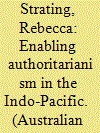

|
|
|
|
|
| Summary/Abstract |
In recent white papers, Australia has identified rising authoritarianism in the region as a key challenge to its regional security interests. Foreign policy discourses highlight Australia’s normative commitment to global democracy, and Australia engages in a range of democratic promotion activities. Democracy promotion by Western states has come under scrutiny by analysts of different ideological persuasions. Critics have framed American ‘exceptionalism’ as really meaning ‘exemptionalism’, referring to its capacities to create exceptions for itself and its own conduct on the global stage, particularly regarding democracy and human rights. This paper argues that this exemptionalism is not limited to the United States: Australia also engages in practices that have undermined its democracy promotion principles. In some cases, Australia’s policies have enabled authoritarianism to flourish unchecked. This paper uses Australia’s refugee policy and its effect on the small Pacific Island state of Nauru as a case study. It highlights how the securitisation of asylum seekers for electoral purposes has contributed to Australia carving out an exception for itself in both adherence to international refugee law and the promotion of democracy. It finds that formal democratic processes within Australia have produced undemocratic outcomes in foreign policy.
|
|
|
|
|
|
|
|
|
|
|
|
|
|
|
|
| 7 |
ID:
172238
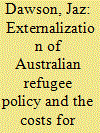

|
|
|
|
|
| Summary/Abstract |
This article argues that Australia’s increasingly externalized refugee policy harms queer asylum seekers and refugees. Australia’s refugee and foreign policies perpetuate colonial and homophobic relations with states such as Indonesia, Papua New Guinea, and Nauru to meet Australia’s border security priorities. The lack of recognition of queer people in Australia’s foreign policy and the harm caused by its regional refugee policies represent a clear contradiction to Australia’s claimed liberal human rights diplomatic position.
|
|
|
|
|
|
|
|
|
|
|
|
|
|
|
|
| 8 |
ID:
141559
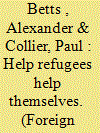

|
|
|
|
|
| Summary/Abstract |
There are now some 60 million displaced people around the world, more than at any time since World War II. The Syrian crisis alone, which has created the largest refugee shock of the era, has displaced some ten million people, around four million of them across international borders. In recent months, Western attention has focused almost exclusively on the flood of these refugees to Europe. Yet most of the Syrian refugees have been taken in not by Western countries but by Syria’s neighboring states: Jordan, Lebanon, and Turkey, whose capacity has been overwhelmed. Lebanon, with a population of around four million and a territory smaller than Maryland, is hosting over a million Syrian refugees. Young people are overrepresented in the refugee population, so that more than half of the school-aged children in Lebanon are now Syrian.
|
|
|
|
|
|
|
|
|
|
|
|
|
|
|
|
| 9 |
ID:
156854
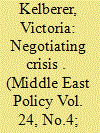

|
|
|
|
|
| Summary/Abstract |
Since 2003, the Hashemite Kingdom of Jordan has been severely tested by armed conflicts in Iraq and Syria, taking in hundreds of thousands of refugees and experiencing economic and demographic shocks as a result. Jordan now hosts more than 654,000 Syrian refugees registered with the UN High Commissioner for Refugees (UNHCR);1 the 2015 census estimated that there were 1.26 million Syrians living in the country.2 Approximately 79 percent of the registered Syrian refugees live outside of Jordan's two refugee camps for Syrians, Zaatari and al-Azraq.
|
|
|
|
|
|
|
|
|
|
|
|
|
|
|
|
| 10 |
ID:
183823
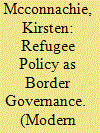

|
|
|
|
|
| Summary/Abstract |
Refugees have been largely overlooked in analyses of Myanmar's transition, apparently considered peripheral to more prominent topics such as negotiation with armed groups, economic reform, and political elections. By analysing approaches to return and repatriation in three distinct contexts—refugees in camps in Thailand, Rohingya refugees in Bangladesh, and Chin refugees in Malaysia and India—this article shows that proposals for the return and repatriation of refugees are a form of ‘border governance' (that is, governance in, of, and through borders). This operates at three scales: (1) global border control by keeping refugees in their region of origin or returning them to their country of origin, (2) national border control by reinforcing boundaries between Myanmar and its surrounding states, and (3) the governance of political transition by reinforcing the Myanmar government’s narrative of peacebuilding by recasting continuing conflict as conditions suitable for refugee return. Premature promotion of repatriation has a number of harmful outcomes for refugee communities: encouraging the withdrawal of international aid, escalating fear and uncertainty, and political bolstering of a Bamar-dominated government and military vis-a-vis ethnic minority groups. This analysis supports a broader understanding of repatriation and its consequences, recognising that the promotion of refugee return can have significant political implications that are apparent even before mass returns have been carried out and which may reverberate far into the future.
|
|
|
|
|
|
|
|
|
|
|
|
|
|
|
|
| 11 |
ID:
101140
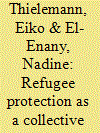

|
|
|
|
|
| Publication |
2010.
|
| Summary/Abstract |
Refugee protection efforts have been shown to suffer from substantial collective action problems due to the capacity of restrictive policy measures adopted by one region as a means of shifting refugee responsibilities to other regions. Such responsibility-shifting dynamics have been identified between north and south as well as within these regions. European Union (EU) cooperation on asylum and refugee policies has been criticised for facilitating the adoption of restrictive policy measures and the creation of a 'Fortress Europe'. Fears about the hollowing out of refugee standards have been coupled with concerns about the EU's free-riding on the refugee protection efforts of countries outside the EU. This paper shows that overcoming collective action problems between the Member States has indeed been a key motivation for EU cooperation in this area. However, a comparative analysis of EU asylum laws and refugee protection efforts with those of similar developed countries outside the EU leads to the rejection of some of the assumptions and implications of the 'Fortress Europe' thesis. While there is evidence of north/south burden-shirking and substantial room for improvement in the EU's asylum and refugee regimes, comparative legal research and the analysis of available UNHCR data on other OECD countries suggests that there is no evidence to support the claim that European cooperation has led to uniquely restrictive refugee policies and protection outcomes.
|
|
|
|
|
|
|
|
|
|
|
|
|
|
|
|
| 12 |
ID:
178096
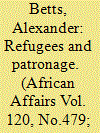

|
|
|
|
|
| Summary/Abstract |
Uganda’s self-reliance policy for refugees has been recognized as among the most progressive refugee policies in the world. In contrast to many refugee-hosting countries, it allows refugees the right to work and freedom of movement. It has been widely praised as a model for other countries to emulate. However, there has been little research on the politics that underlie Uganda’s approach. Why has Uganda maintained these policies despite hosting more refugees than any country in Africa? Based on archival research and elite interviews, this article provides a political history of Uganda’s self-reliance policies from independence to the present. It unveils significant continuity in both the policies and the underlying politics. Refugee policy has been used by Ugandan leaders to strengthen patronage and assert political authority within strategically important refugee-hosting hinterlands. International donors have abetted domestic illiberalism in order to sustain a liberal internationalist success story. The politics of patronage and refugee policy have worked hand-in-hand. Patronage has, in the Ugandan case, been integral to the functioning of the international refugee system. Rather than being an inevitably ‘African’ phenomenon or the unavoidable legacy of colonialism, patronage politics has been enabled by, and essential to, liberal internationalism.
|
|
|
|
|
|
|
|
|
|
|
|
|
|
|
|
|
|
|
|
|